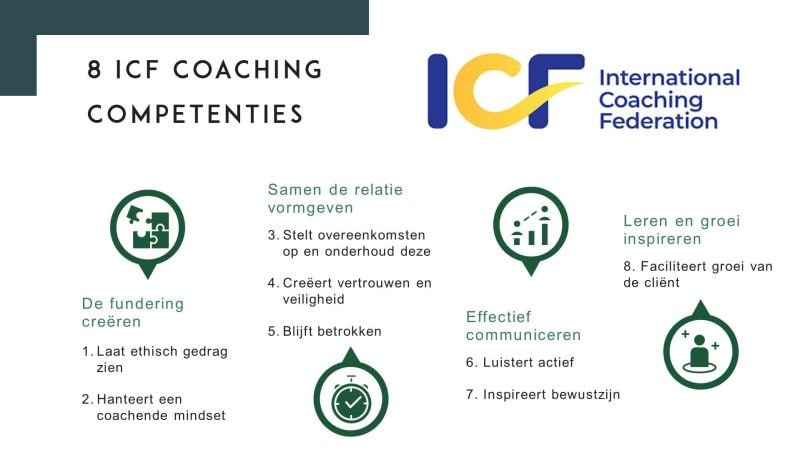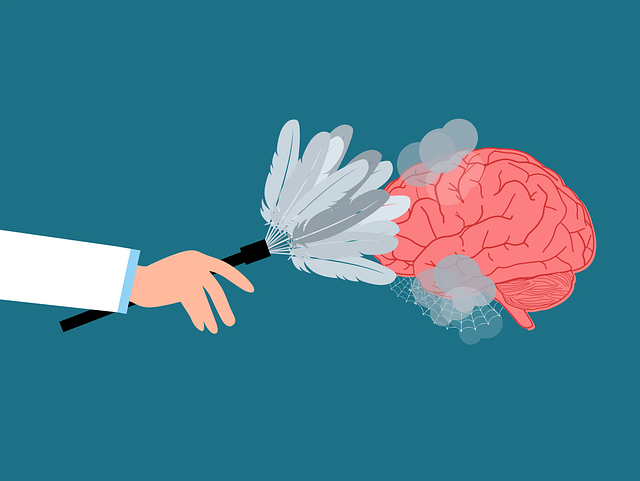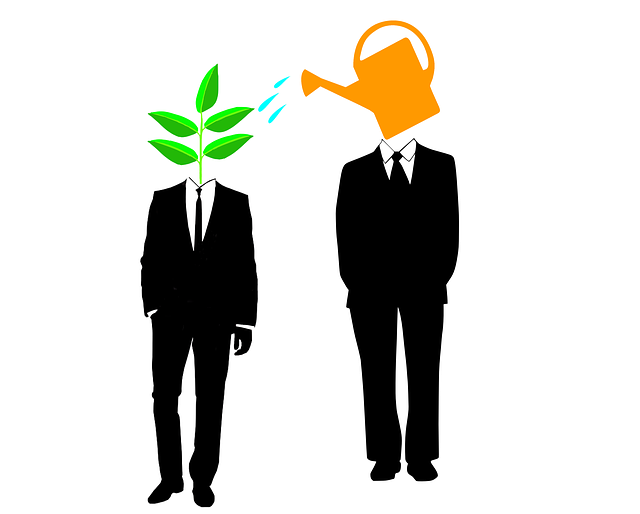Competencies of a Coach: The Key to Successful Coaching
The profession of coaching is a dynamic and multifaceted discipline. Whether you are a coach in the field of personal development, a career coach or you guide teams, as a coach you want to lead your coachee in the most effective way. And to be able to do this, you will need to have a combination of skills, knowledge and attitudes. In other words: be a coach with competence.
In this blog we discuss what competencies are, the role of the International Coach Federation (ICF), the eight core competencies according to the ICF, and what steps you can take as a coach to become more competent.
What are competencies?
Competencies are the skills, knowledge and attitudes that a person needs to function effectively in a particular role or context. For coaches, competencies are essential because they form the basis for guiding and supporting coachees in their personal and professional development. A competent coach is able to ask effective questions, listen actively and create a supportive environment in which the coachee feels safe. These skills help the coach to lead effectively and help coachees to gain new insights, take new actions and achieve goals.
The International Coach Federation (ICF)
The ICF is a leading organization dedicated to advancing the coaching profession and setting high standards for coaches worldwide. The ICF defines what constitutes a professional coach and establishes ethical guidelines that ensure the quality and integrity of coaching practice. A competent coach must follow these guidelines to create a safe, respectful, and confidential environment for their coachees. Adherence to these guidelines helps build mutual respect and trust, which is essential for effective coaching. The ICF emphasizes the importance of continuous learning and development so that coaches can continue to improve their skills and refine their coaching practice.

Core Competencies of the ICF
The ICF has defined four clusters with eight separate competencies within them. These core competencies serve as a guideline for coaches to work in a professional and ethical manner.
A: Creating the foundation
1.Demonstrating ethical behavior
This competency emphasizes the importance of ethical guidelines and professional standards. Coaches must demonstrate integrity, respect confidentiality, and always act in the best interests of the coachee. This forms the basis for all coaching practice and ensures that the coaching relationship is built on trust and respect.
2. A coaching mindset
This includes maintaining an open, curious, flexible and client-focused mindset. Coaches need to be committed to their own development, both professionally and personally in everyday life, and adopt an attitude that is focused on growth and learning. This means that coaches need to recognize and manage their own beliefs and biases, as well as being able to regulate their own emotions.

B: Co-creating the relationship
3. Drafting and maintaining a coaching agreement
This competence focuses on clearly aligning expectations and making clear agreements with the coachee. This includes creating an effective coaching plan, discussing the objectives of the coaching, the responsibilities of both coach and coachee, and drawing up a formal coaching agreement. It is essential for effective cooperation and for achieving the agreed results.
4. Creating trust and safety
This competency is about creating an environment in which the coachee feels safe to be open and express themselves. Building trust and a sense of safety is crucial to facilitating an effective coaching relationship. This includes respect for the coachee and showing genuine care, understanding and concern.
5.Staying involved
Staying engaged means that the coach is fully committed to the relationship with the coachee throughout the coaching process. This means that the coach is consistently present, both physically and emotionally, and that he/she provides constant support to the coachee, regardless of the emotions that arise. Staying engaged strengthens the coaching relationship and ensures that the coachee feels supported in his/her developmental journey.
C: Effective communication
6. Active listening
Active listening is crucial; it involves the coach being fully present in the conversation and paying attention to the coachee’s signals (both verbal and non-verbal) and underlying emotions. Listening to what the coachee is saying helps the coach to fully understand the context of the coachee’s situation and provides a deeper insight into the coachee’s needs and challenges.
7. Inspiring awareness
This competence involves asking powerful questions, providing clear and relevant feedback, and fostering open dialogue. The goal is to help the coachee explore new perspectives, gain insights, and discover new possibilities. This process promotes self-awareness and helps the coachee to develop.

D: Inspiring learning and growth
8. Facilitating growth
This competence focuses on promoting the learning and development of the coachee. Coaches support coachees in reflecting on their experiences, developing action plans and taking responsibility for their own growth. This also includes creating awareness and encouraging self-reflection and self-insight, which is essential for sustainable change and progress.

Developing competence
A good coach will observe and live up to the core competencies above. In practice, however, this is easier said than done. It requires certain skills, knowledge and attitudes that do not just come naturally to every coach.
The good news is: you can improve and develop your competence. In fact, it is an ongoing process that you as a coach can continuously reflect on and grow in. We have listed a number of steps that you can look at to become better at coaching.
- Reflect: Self-reflection is crucial. Look at your current situation. Where can you take more responsibility as a coach? What skill can you sharpen? By regularly reflecting on coaching conversations and asking for feedback from coachees, you can improve your coaching and approach. This awareness creates opportunities for personal growth.
- Continue learning and developing: A professional coach continues to work on his/her development. This can be done by following a training to learn a new skill, following a course or attending workshops and conferences. Think of a communication education or training where asking effective questions and active listening are central. Continuous self-development will not only provide you with new information, it also contributes to improving existing competencies.
- Seek supervision and mentoring: Working with a mentor can help coaches improve their practice and gain new insights. An external coach can provide valuable feedback and help develop new perspectives.
- Networking with other coaches: Participating in professional networks and coaching communities can provide valuable insights and support. By engaging in conversation and sharing experiences, you can learn from a variety of sources and approaches.
- Ethics: Following the ethical guidelines of the ICF or other professional bodies ensures that you are coaching in a professional and responsible manner. This helps maintain a high standard of professionalism and integrity.

Conclusion
Competencies are the building blocks of effective coaching. They enable a coach to create a safe and supportive environment in which coachees can grow and achieve their goals. A coach can have a positive impact on the coachee by encouraging their self-expression and helping them develop a stronger self-identity.
With the right combination of knowledge, (communication) skills and ethics, a coach can make a world of difference in the life of a coachee. By being aware of their own responsibilities and continuously learning, a coach can not only improve their own competencies, but also have a lasting, positive impact on the coachees they guide. It is important that coaches recognize the value of mutual respect and trust, as these form the basis of any successful coaching relationship. Ultimately, it is about creating an environment in which the coachee can fully develop and where the coach knows how to best support.
At Trackler we strive for the highest standards in coaching and are committed to supporting both our coaches and coachees on their journey to success and self-development.